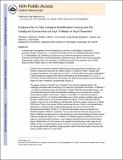Evidence for in Situ Catalyst Modification during the Pd-Catalyzed Conversion of Aryl Triflates to Aryl Fluorides
Author(s)
Maimone, Thomas; Kinzel, Tom; Zhang, Yong; Takase, Michael K.; Milner, Phillip John; Buchwald, Stephen Leffler; ... Show more Show less
DownloadBuchwald_Evidence for in situ.pdf (1.857Mb)
PUBLISHER_POLICY
Publisher Policy
Article is made available in accordance with the publisher's policy and may be subject to US copyright law. Please refer to the publisher's site for terms of use.
Terms of use
Metadata
Show full item recordAbstract
A mechanistic investigation of the Pd-catalyzed conversion of aryl triflates to fluorides is presented. Studies reveal that C–F reductive elimination from a LPd[superscript II](aryl)F complex (L = t-BuBrettPhos or RockPhos) does not occur when the aryl group is electron rich. Evidence is presented that a modified phosphine, generated in situ, serves as the actual supporting ligand during catalysis with such substrates. A preliminary study of the reactivity of a LPd[superscript II](aryl)F complex based on this modified ligand is reported.
Date issued
2011-10Department
Massachusetts Institute of Technology. Department of Chemistry; Massachusetts Institute of Technology. Department of Materials Science and EngineeringJournal
Journal of the American Chemical Society
Publisher
American Chemical Society (ACS)
Citation
Maimone, Thomas J., Phillip J. Milner, Tom Kinzel, Yong Zhang, Michael K. Takase, and Stephen L. Buchwald. “Evidence for in Situ Catalyst Modification during the Pd-Catalyzed Conversion of Aryl Triflates to Aryl Fluorides.” Journal of the American Chemical Society 133, no. 45 (November 16, 2011): 18106-18109.
Version: Author's final manuscript
ISSN
0002-7863
1520-5126